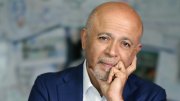Abraham Verghese, a physician and writer who is Linda R. Meier and Joan F. Lane provostial professor of medicine in the Department of Medicine at Stanford, will be the speaker at Harvard’s 374th Commencement exercises on the morning of May 29, where he will receive an honorary degree. The University made the announcement this afternoon.
Verghese, whose parents, from Kerala, India, were teachers in Ethiopia, was born and began his training there, but emigrated to the United States in 1974, during the civil war that deposed Emperor Haile Selassie. He ultimately pursued his medical education in Madras and then became a medical resident in Johnson City, Tennessee, where he subsequently became aware of the arrival of HIV/AIDS in rural America—the subject of his shattering first book, a memoir titled My Own Country: A Doctor’s Story (1994). It recounts the increasing prevalence of the disease among the local gay community, the difficulties of caring for a stigmatized population, and the challenges of delivering medicine humanely in the U.S. care system. (Mira Nair ’79 directed the movie version.) As he notes in his online biography, the work in Tennessee taught him the difference between healing and curing: “One can be healed even when there is no cure, by which I mean a coming to terms with the illness, finding some level of peace and acceptance in such a terrible setting; this is something a physician can, if they are lucky, help facilitate.”
Those two threads—primary care and training of medical personnel, and reflective nonfiction and novels—have defined Verghese’s trajectory ever since.
The University’s announcement notes that Verghese is “devoted to humanizing the physician-patient relationship,” It cites his role as the founder of Presence, an interdisciplinary center at Stanford focused on championing the human experience in medicine, and of Stanford Medicine 25, an initiative designed to foster the time-honored, skilled bedside exam for learners and for medical professionals. “Verghese has devoted his academic career to teaching the next generation of physicians these skills and the critical importance of empathy, human connection, and compassion in healthcare,” according to the announcement.
Verghese also wrote a second memoir, The Tennis Partner, and two novels, Cutting for Stone and The Covenant of Water.
In addition to his medical training and later academic position in eastern Tennessee, Verghese served an infectious diseases fellowship at Boston University. He then held appointments as professor of medicine and chief of the Division of Infectious Diseases at Texas Tech Health Sciences Center, El Paso, and subsequently became the founding director of the Center for Medical Humanities and Ethics at the University of Texas Health Science Center at San Antonio. He moved to Stanford in 2007 (where he overlapped with the then-Kaiser professor and professor of medicine and economics Alan M. Garber ’77, Ph.D. ’82—who as Harvard’s president now made today’s announcement).
An elected member of the National Academy of Medicine and the American Academy of Arts and Sciences, Verghese was awarded the National Humanities Medal in 2016 by President Barack Obama, J.D. ’91. The citation reads, “For reminding us that the patient is the center of the medical enterprise. His range of proficiency embodies the diversity of the humanities; from his efforts to emphasize empathy in medicine, to his imaginative renderings of the human drama.”
In the announcement, Garber said of the guest speaker, “Throughout his remarkable career, Dr. Abraham Verghese has followed his wide-ranging interests to carve a unique path distinguished by breathtaking creativity, outstanding achievement, and exemplary service and leadership. He has pursued excellence across disciplines with an intensity surpassed only by his humanity, which shines brilliantly through his works of both fiction and non-fiction, as well as his work as a clinician and teacher. I count myself among his legion of admirers, and I cannot imagine a better individual to inspire the members of our class of 2025 as they contemplate their futures.”









